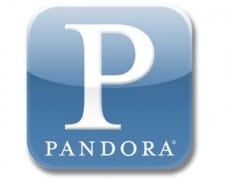 As we reported on the capability last November, Pandora is now offering political advertisers audience-targeting. But at what cost? ProPublica reports North Carolina resident Crystal Harris was listening to Garth Brooks’ “Much Too Young (To Feel This Damn Old)” when an ad appeared on her iPhone screen, followed by a pop-up message.
As we reported on the capability last November, Pandora is now offering political advertisers audience-targeting. But at what cost? ProPublica reports North Carolina resident Crystal Harris was listening to Garth Brooks’ “Much Too Young (To Feel This Damn Old)” when an ad appeared on her iPhone screen, followed by a pop-up message.
“To help Mitt Romney become the next president, Romney for President, Inc would like to use your email address — tap OK to let Pandora share this info,” the message read.
Harris took a screenshot of the request and tweeted it with a one-word comment: #fail.
“Don’t harass me on my email. Don’t stalk me on the apps that I use. To me, that just crossed the line,” Harris told ProPublica.
Pandora’s targeted email sharing pitch isn’t new, but it’s being offered to political advertisers for the first time this year. Both Democrats and Republicans, and both local and national campaigns, have used the service to collect voter emails.
It’s among the latest in a series of increasingly sophisticated tactics that campaigns are using to target narrow groups of voters online — from sending ads to Internet users who have visited a candidate’s website, to creating a mobile app for campaign volunteers that marks the names and addresses of nearby voters on a Google map.
In the case of the Pandora ad, it’s not clear why the Romney pop-up appeared on Harris’ screen — whether she was targeted, because, for instance, she lives in a swing state, or because she was listening to Garth Brooks.
Pandora unveiled new targeting features that give political campaign strategists the option to target voters by state, county and congressional districts, as well as metropolitan survey areas (MSA), and designated market areas (DMA).
Campaigns of all sizes are able to deliver their messages to custom voter zones in an uncluttered radio environment (Pandora plays only one audio ad per break). The service also offers display and video components in addition to audio. Campaigns on Pandora service run on websites, mobile phones, tablets and consumer electronic devices such as TVs, Blu-ray players and DVRs.
Pandora gathers zip code data at account registration and a back-end system maps that information into specific regions, making it easier for a campaign to maximize effectiveness. These new features add on to the previously available targeting parameters of age, gender, zip code, time of day, music genre, seeded artist, interaction, mobile and first impression.
Pandora said the email sharing feature simply gives listeners what they want. “Sometimes, a listener wants to learn more about a product that’s being advertised on Pandora, whether it’s a car, a movie, or a political candidate,” Sean Duggan, Pandora’s VP/Advertising, told ProPublica an emailed statement. “On mobile, in particular, we offer many ways for a listener to do this: tapping on a banner ad, tap-to-email, tap-to-call or even opting-in to receive emails from the advertiser. Pandora does not make public or share a user’s registration information with third-parties without the user’s explicit consent,” Duggan said.
A Pandora spokeswoman added that the email sharing was “triple opt-in,” since users have to click on the ad, then click OK, before Pandora shares their emails with a campaign or other advertiser.
Users who get emails from a campaign or advertiser always have the option to unsubscribe.
There is evidence that the Romney campaign pays attention to the musical taste of potential supporters. Earlier this year, the campaign told The New York Times that their online targeting research had revealed that people who like jazz were less likely to respond to their online ads.
Harris, who said she’s a registered Democrat, was listening to Pandora on an afternoon run when she received several Romney ads in a row — as well as a Pandora ad for the Obama campaign. Pandora said it was extremely rare for users to receive the same ad multiple times in a short period.
Harris said she loves Pandora but that political ads may convince her to upgrade to an ad-free version of the service.
RBR-TVBR observation: Maybe that’s the thought all along from Pandora, but they should watch how invasive (read: interactive) these ads are. It’s pretty easy to target geographically, but the bulk of Pandora’s listening comes from custom channels created by listeners, not the pre-defined formats they also offer. There could be plenty of waste trying to target user-created channel listeners, as many are like songs on an iPod—a little bit of everything.






This is silly. If you don’t want ads pay the $3 a month. Don’t act like your rights are being violated because you’re getting free music and received an ad to cover the costs.
Nobody said their rights were being violated. They just want to how to make it stop. It’s clearly in Pandora’s interest to not alienate their customers and to resolve to send targeted ads that are most likely to benefit their advertisers. Long after the election I’m getting political policy ads that I dislike. Since I can’t figure out how to make these particular ads stop, I’m considering just dropping Pandora altogether. No hard feelings – I just vote with my feet.
Comments are closed.